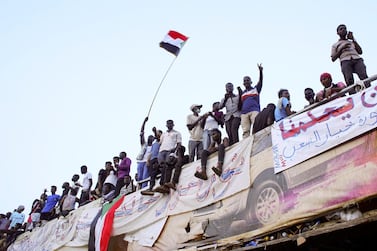As Sudan's political landscape shifts, the economy is slipping further into crisis, with shortages of essential items like flour and fuel.
The military, which has ousted long-time President Omar Al Bashir, on Friday appealed for financial aid from regional peers to tackle the worsening economic situation.
The IMF's forecasts for this year are of real GDP shrinking by 2.3 per cent, while consumer prices will soar by 49.6 per cent.
"We want your donations as we have some economic issues," the head of the military council's political committee, Lieutenant General Omar Zain Al Abdin, told Arab and African diplomats in a televised meeting, citing "a shortage of essential items like flour and fuel", Reuters reported.
Since last year, public anger has been building over price rises and other economic hardships - including a doubling in the cost of bread this year and limits on bank withdrawals. In December, thousands went to the streets to protest against soaring prices in demonstrations that turned deadly.
Despite attempts by Mr Bashir - who had ruled the country for three decades - to defuse the anger sweeping through Sudan, ultimately the swell of discontent led to popular calls for political change. Huge protests resulted in his removal last week by the military, which said it would oversee a two-year transitional period.
However, the political situation remains fluid. Sudan's defence minister Awad Ibn Auf stepped down abruptly on Friday as head of the country's transitional ruling military council after only a day in the post, as protesters demanded quicker political change.
At 69 per cent, Sudan’s inflation rate is among the world’s highest. Severe shortages have forced people to queue at bakeries and petrol stations.
In October, Sudan sharply devalued its currency after the government asked a body of banks and money changers to set the exchange rate on a daily basis. The move led to further price increases and cash shortages, while the gap between the official and black market rates has continued to widen.
“Economic conditions in Sudan have been challenging since the secession of South Sudan in 2011 and the loss of the bulk of oil production and exports, which have compounded the difficult external environment,” a December 2017 International Monetary Fund report said.
Apart from Somalia, Sudan is now the only country in the world with arrears to the IMF, accounting for more than 80 per cent of money overdue to the multilateral lender.
The IMF stated Sudan was eligible for debt relief under the Heavily Indebted Poor Countries (HIPC) plan - an IMF and World Bank initiative launched in 1996 to help poor countries struggling with external debt obtain debt relief.
"Public external debt is around $51bn," said Stuart Culverhouse, head of sovereign and fixed income research at Exotix, citing 2016 IMF data. "[This] is 88 per cent of GDP. The ratio is likely to be higher now because of a weaker currency."
The US government lifted most of its sanctions on Sudan in February 2017, according to Bloomberg, but kept the country on its list of state sponsors of terrorism. This keeps the economy in a stranglehold, making it next to impossible for businesses to transact in US dollars and cutting off any access to international capital markets and many other funding sources for the government.
One outcome of the current political volatility is that it has sparked fresh interest among traders and holders of Sudan's long-defaulted debt.
"This is a big moment for the country. Now we need to see what happens next, what sort of a government or leader they will get, and how the situation will develop," said one holder of the defaulted loans, speaking on condition of anonymity.
"There's a potential for real change, but change isn't always for the better and it could take a very long time for things to improve."
Frozen for the best part of four decades, Sudan's debt is part of a highly opaque market of legacy debts of countries isolated from the rest of the international community, such as pre-Castro Cuban debt or loans issued by North Korea.
By now analysts estimate the amount due including nearly four decades of unpaid interest amounts to around 8bn Swiss francs.







